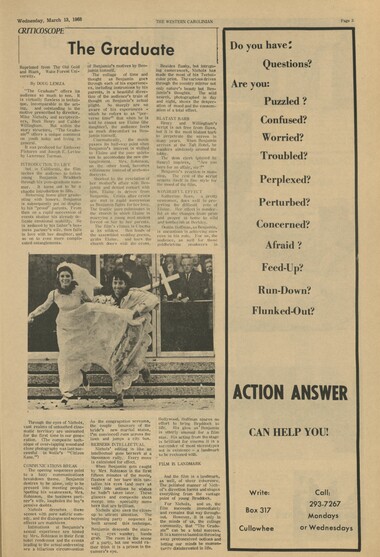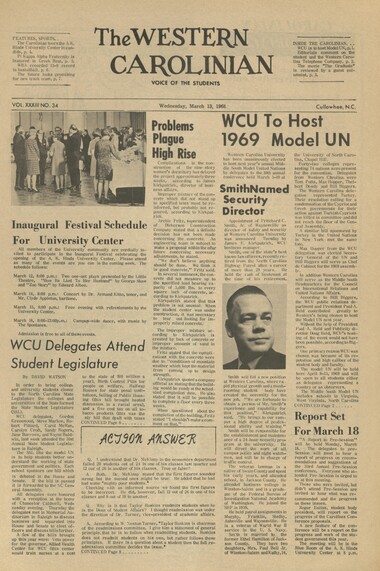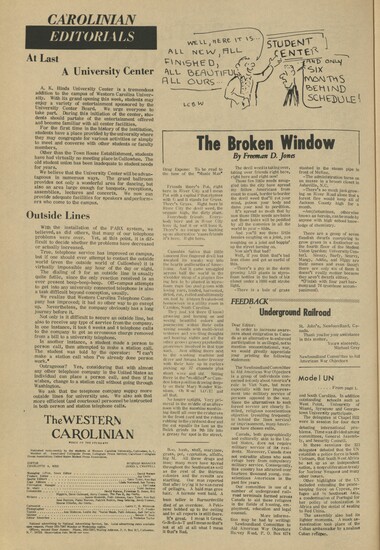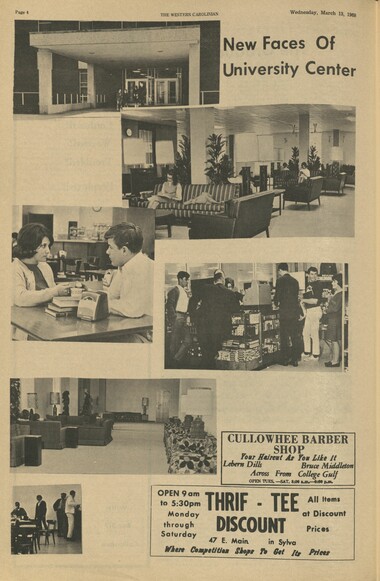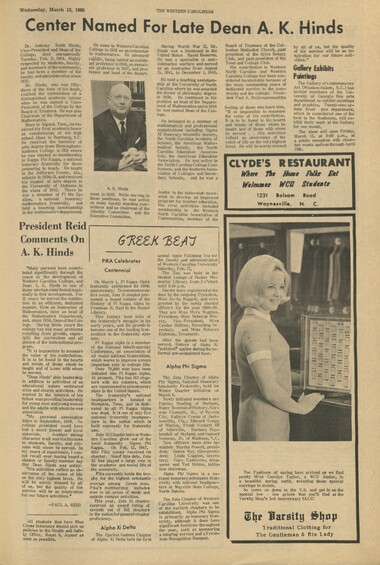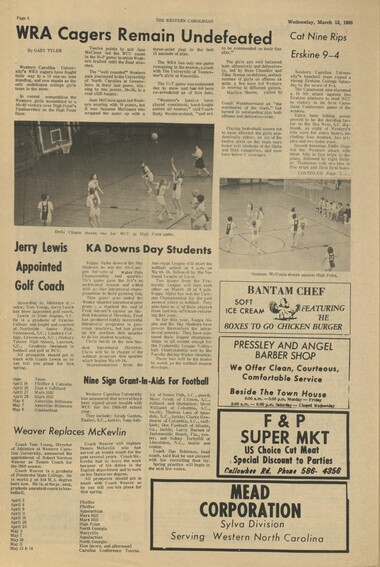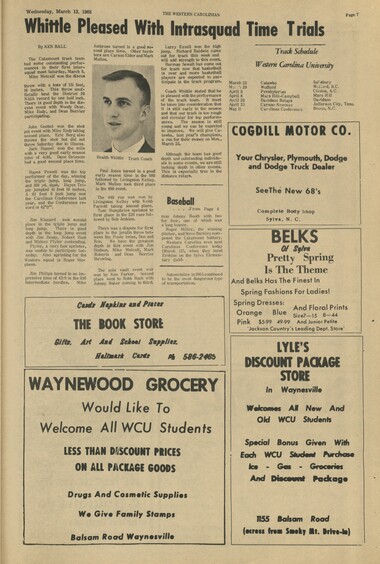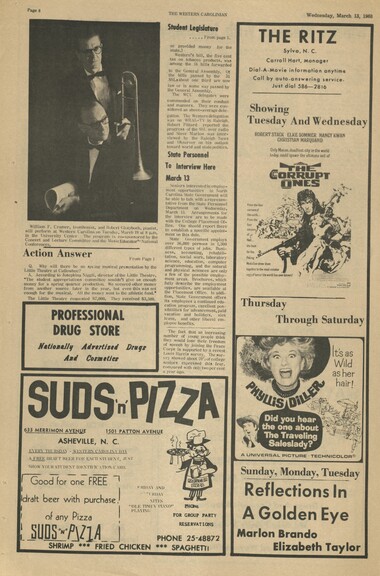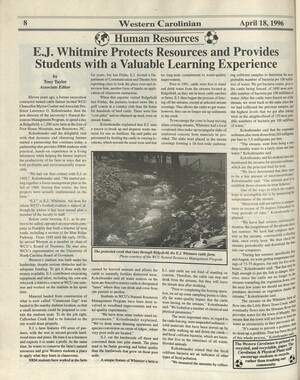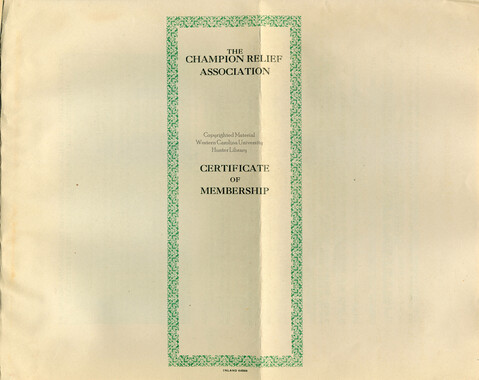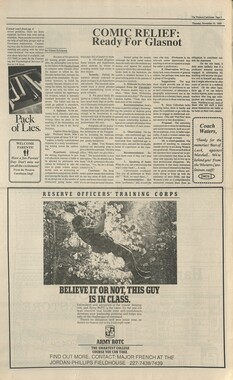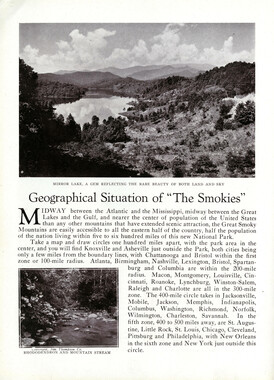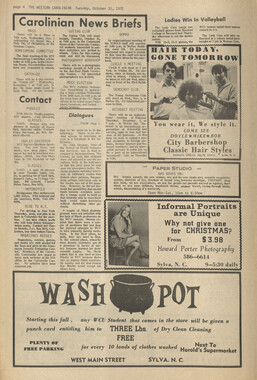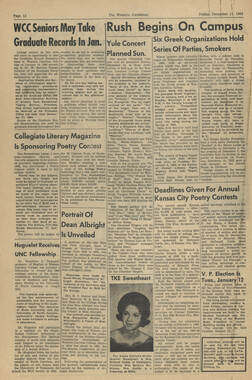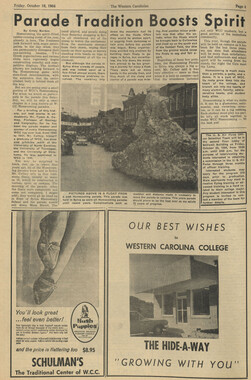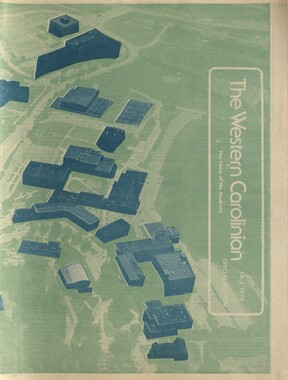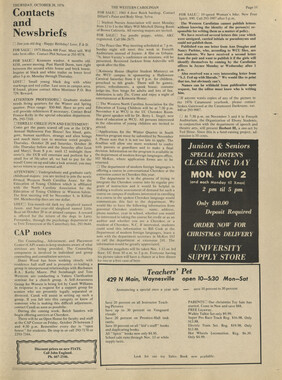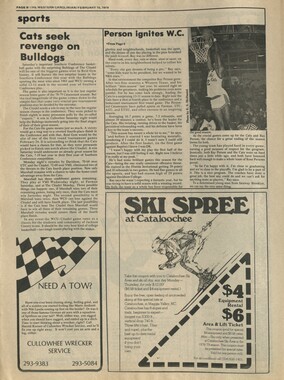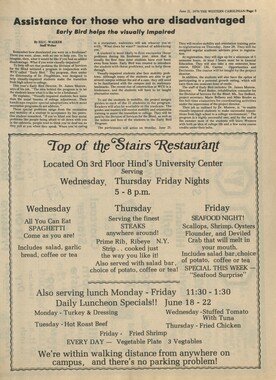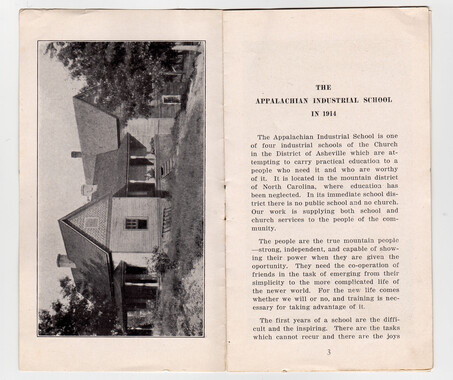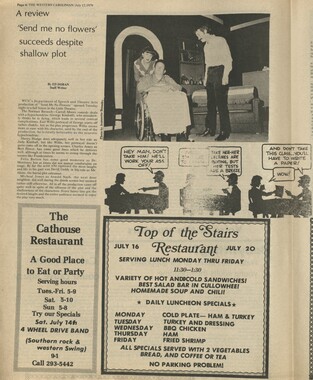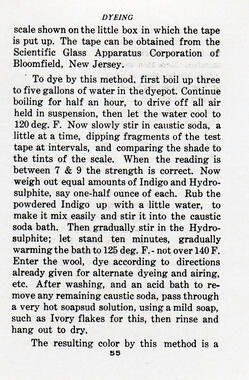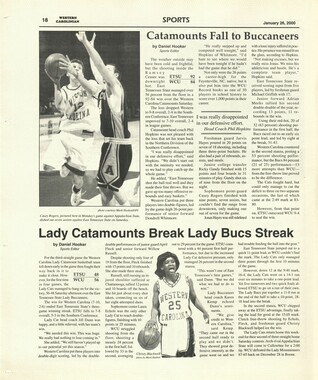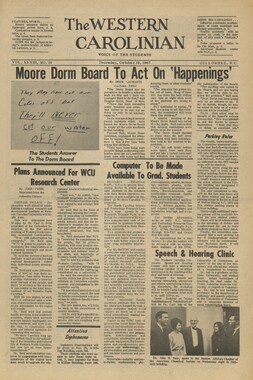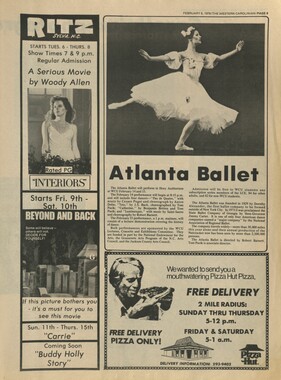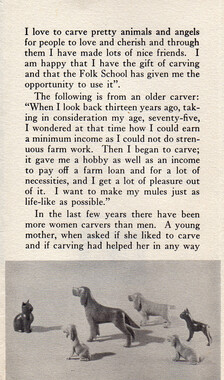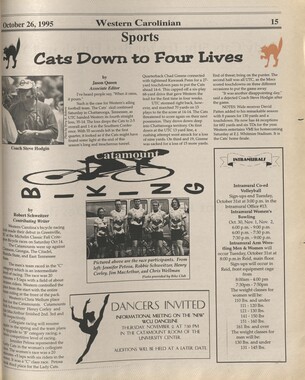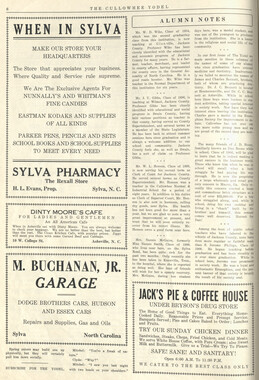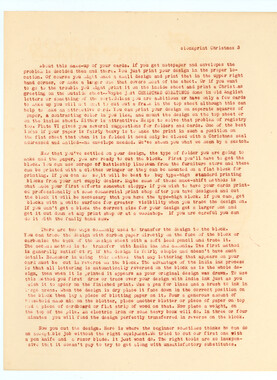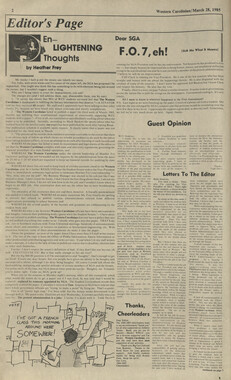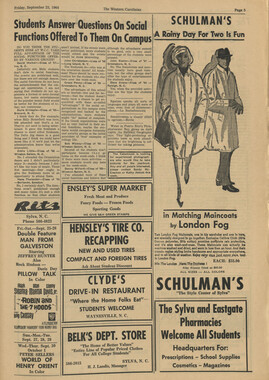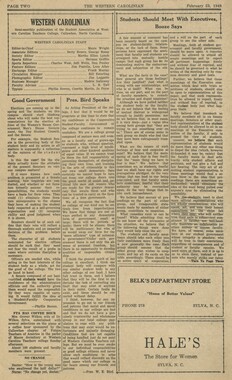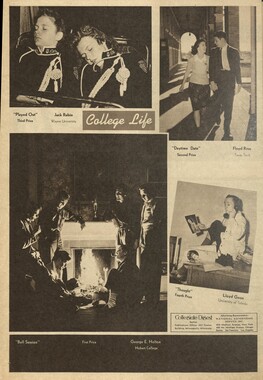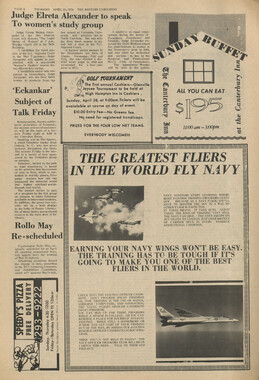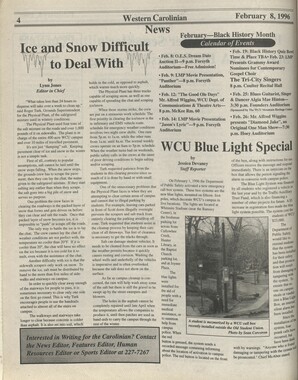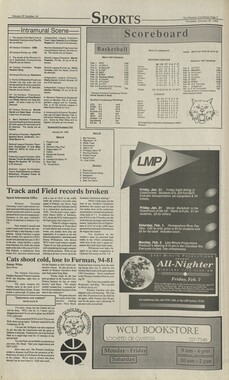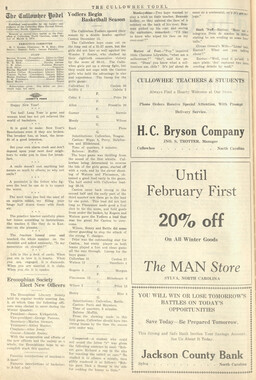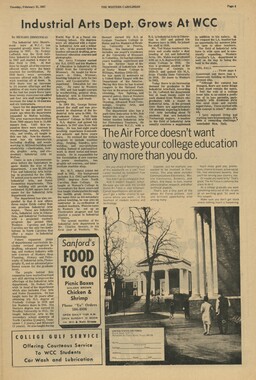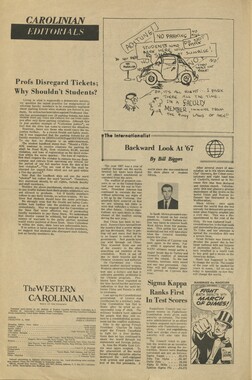Western Carolina University (20)
View all
- Canton Champion Fibre Company (2308)
- Cherokee Traditions (292)
- Civil War in Southern Appalachia (165)
- Craft Revival (1942)
- Great Smoky Mountains - A Park for America (2766)
- Highlights from Western Carolina University (430)
- Horace Kephart (941)
- Journeys Through Jackson (154)
- LGBTQIA+ Archive of Jackson County (85)
- Oral Histories of Western North Carolina (314)
- Picturing Appalachia (6772)
- Stories of Mountain Folk (413)
- Travel Western North Carolina (160)
- Western Carolina University Fine Art Museum Vitreograph Collection (129)
- Western Carolina University Herbarium (92)
- Western Carolina University: Making Memories (708)
- Western Carolina University Publications (2283)
- Western Carolina University Restricted Electronic Theses and Dissertations (146)
- Western North Carolina Regional Maps (71)
- World War II in Southern Appalachia (131)
University of North Carolina Asheville (6)
View all
- Allanstand Cottage Industries (62)
- Appalachian National Park Association (53)
- Bennett, Kelly, 1890-1974 (1388)
- Berry, Walter (76)
- Brasstown Carvers (40)
- Carver, George Washington, 1864?-1943 (26)
- Cathey, Joseph, 1803-1874 (1)
- Champion Fibre Company (233)
- Champion Paper and Fibre Company (297)
- Cherokee Indian Fair Association (16)
- Cherokee Language Program (22)
- Crowe, Amanda (40)
- Edmonston, Thomas Benton, 1842-1907 (7)
- Ensley, A. L. (Abraham Lincoln), 1865-1948 (275)
- Fromer, Irving Rhodes, 1913-1994 (70)
- George Butz (BFS 1907) (46)
- Goodrich, Frances Louisa (120)
- Grant, George Alexander, 1891-1964 (96)
- Heard, Marian Gladys (60)
- Kephart, Calvin, 1883-1969 (15)
- Kephart, Horace, 1862-1931 (313)
- Kephart, Laura, 1862-1954 (39)
- Laney, Gideon Thomas, 1889-1976 (439)
- Masa, George, 1881-1933 (61)
- McElhinney, William Julian, 1896-1953 (44)
- Niggli, Josephina, 1910-1983 (10)
- North Carolina Park Commission (105)
- Osborne, Kezia Stradley (9)
- Owens, Samuel Robert, 1918-1995 (11)
- Penland Weavers and Potters (36)
- Roberts, Vivienne (15)
- Roth, Albert, 1890-1974 (142)
- Schenck, Carl Alwin, 1868-1955 (1)
- Sherrill's Photography Studio (2565)
- Southern Highland Handicraft Guild (127)
- Southern Highlanders, Inc. (71)
- Stalcup, Jesse Bryson (46)
- Stearns, I. K. (213)
- Thompson, James Edward, 1880-1976 (226)
- United States. Indian Arts and Crafts Board (130)
- USFS (683)
- Vance, Zebulon Baird, 1830-1894 (1)
- Weaver, Zebulon, 1872-1948 (58)
- Western Carolina College (230)
- Western Carolina Teachers College (282)
- Western Carolina University (1794)
- Western Carolina University. Mountain Heritage Center (18)
- Whitman, Walt, 1819-1892 (10)
- Wilburn, Hiram Coleman, 1880-1967 (73)
- Williams, Isadora (3)
- Cain, Doreyl Ammons (0)
- Crittenden, Lorraine (0)
- Rhodes, Judy (0)
- Smith, Edward Clark (0)
- Appalachian Region, Southern (2569)
- Asheville (N.C.) (1923)
- Avery County (N.C.) (26)
- Blount County (Tenn.) (161)
- Buncombe County (N.C.) (1672)
- Cherokee County (N.C.) (283)
- Clay County (N.C.) (555)
- Graham County (N.C.) (233)
- Great Smoky Mountains National Park (N.C. and Tenn.) (519)
- Haywood County (N.C.) (3524)
- Henderson County (N.C.) (70)
- Jackson County (N.C.) (4694)
- Knox County (Tenn.) (25)
- Knoxville (Tenn.) (12)
- Lake Santeetlah (N.C.) (10)
- Macon County (N.C.) (420)
- Madison County (N.C.) (212)
- McDowell County (N.C.) (39)
- Mitchell County (N.C.) (132)
- Polk County (N.C.) (35)
- Qualla Boundary (981)
- Rutherford County (N.C.) (76)
- Swain County (N.C.) (2115)
- Transylvania County (N.C.) (270)
- Watauga County (N.C.) (12)
- Waynesville (N.C.) (84)
- Yancey County (N.C.) (72)
- Aerial Photographs (3)
- Aerial Views (60)
- Albums (books) (4)
- Articles (1)
- Artifacts (object Genre) (228)
- Bibliographies (1)
- Biography (general Genre) (2)
- Cards (information Artifacts) (38)
- Clippings (information Artifacts) (191)
- Crafts (art Genres) (622)
- Depictions (visual Works) (21)
- Design Drawings (1)
- Drawings (visual Works) (184)
- Envelopes (73)
- Facsimiles (reproductions) (1)
- Fiction (general Genre) (4)
- Financial Records (12)
- Fliers (printed Matter) (67)
- Glass Plate Negatives (381)
- Guidebooks (2)
- Internegatives (10)
- Interviews (815)
- Land Surveys (102)
- Letters (correspondence) (1013)
- Manuscripts (documents) (618)
- Maps (documents) (177)
- Memorandums (25)
- Minutes (administrative Records) (59)
- Negatives (photographs) (5835)
- Newsletters (1285)
- Newspapers (2)
- Occupation Currency (1)
- Paintings (visual Works) (1)
- Pen And Ink Drawings (1)
- Periodicals (193)
- Personal Narratives (10)
- Photographs (12976)
- Plans (maps) (1)
- Poetry (6)
- Portraits (4533)
- Postcards (329)
- Programs (documents) (151)
- Publications (documents) (2236)
- Questionnaires (65)
- Scrapbooks (282)
- Sheet Music (2)
- Slides (photographs) (402)
- Songs (musical Compositions) (2)
- Sound Recordings (796)
- Specimens (92)
- Speeches (documents) (15)
- Tintypes (photographs) (8)
- Transcripts (322)
- Video Recordings (physical Artifacts) (23)
- Vitreographs (129)
- Text Messages (0)
- A.L. Ensley Collection (275)
- Appalachian Industrial School Records (7)
- Appalachian National Park Association Records (336)
- Axley-Meroney Collection (2)
- Bayard Wootten Photograph Collection (20)
- Bethel Rural Community Organization Collection (7)
- Blumer Collection (5)
- C.W. Slagle Collection (20)
- Canton Area Historical Museum (2110)
- Carlos C. Campbell Collection (282)
- Cataloochee History Project (64)
- Cherokee Studies Collection (4)
- Daisy Dame Photograph Album (5)
- Daniel Boone VI Collection (1)
- Doris Ulmann Photograph Collection (112)
- Elizabeth H. Lasley Collection (1)
- Elizabeth Woolworth Szold Fleharty Collection (4)
- Frank Fry Collection (95)
- George Masa Collection (173)
- Gideon Laney Collection (452)
- Hazel Scarborough Collection (2)
- Hiram C. Wilburn Papers (28)
- Historic Photographs Collection (236)
- Horace Kephart Collection (861)
- Humbard Collection (33)
- Hunter and Weaver Families Collection (1)
- I. D. Blumenthal Collection (4)
- Isadora Williams Collection (4)
- Jesse Bryson Stalcup Collection (47)
- Jim Thompson Collection (224)
- John B. Battle Collection (7)
- John C. Campbell Folk School Records (80)
- John Parris Collection (6)
- Judaculla Rock project (2)
- Kelly Bennett Collection (1407)
- Love Family Papers (11)
- Major Wiley Parris Civil War Letters (3)
- Map Collection (12)
- McFee-Misemer Civil War Letters (34)
- Mountain Heritage Center Collection (4)
- Norburn - Robertson - Thomson Families Collection (44)
- Pauline Hood Collection (7)
- Pre-Guild Collection (2)
- Qualla Arts and Crafts Mutual Collection (12)
- R.A. Romanes Collection (681)
- Rosser H. Taylor Collection (1)
- Samuel Robert Owens Collection (94)
- Sara Madison Collection (144)
- Sherrill Studio Photo Collection (2558)
- Smoky Mountains Hiking Club Collection (616)
- Stories of Mountain Folk - Radio Programs (374)
- The Reporter, Western Carolina University (510)
- Venoy and Elizabeth Reed Collection (16)
- WCU Gender and Sexuality Oral History Project (32)
- WCU Mountain Heritage Center Oral Histories (25)
- WCU Oral History Collection - Mountain People, Mountain Lives (71)
- WCU Students Newspapers Collection (1744)
- Western North Carolina Tomorrow Black Oral History Project (69)
- William Williams Stringfield Collection (2)
- Zebulon Weaver Collection (109)
- African Americans (390)
- Appalachian Trail (35)
- Artisans (521)
- Cherokee art (84)
- Cherokee artists -- North Carolina (10)
- Cherokee language (21)
- Cherokee pottery (101)
- Cherokee women (208)
- Church buildings (170)
- Civilian Conservation Corps (U.S.) (110)
- College student newspapers and periodicals (1830)
- Dams (107)
- Dance (1023)
- Education (222)
- Floods (61)
- Folk music (1015)
- Forced removal, 1813-1903 (2)
- Forest conservation (220)
- Forests and forestry (1184)
- Gender nonconformity (4)
- Great Smoky Mountains National Park (N.C. and Tenn.) (181)
- Hunting (38)
- Landscape photography (25)
- Logging (118)
- Maps (83)
- Mines and mineral resources (8)
- North Carolina -- Maps (18)
- Paper industry (38)
- Postcards (255)
- Pottery (135)
- Railroad trains (71)
- Rural electrification -- North Carolina, Western (3)
- School integration -- Southern States (2)
- Segregation -- North Carolina, Western (5)
- Slavery (5)
- Sports (452)
- Storytelling (244)
- Waterfalls -- Great Smoky Mountains (N.C. and Tenn.) (66)
- Weaving -- Appalachian Region, Southern (280)
- Wood-carving -- Appalachian Region, Southern (328)
- World War, 1939-1945 (173)
Western Carolinian Volume 33 Number 34
Item
Item’s are ‘child’ level descriptions to ‘parent’ objects, (e.g. one page of a whole book).
-
-
Wednesday, March 13, 1968 CRTTICOSGOPE THE WESTERN CAROLINIAN Page 3 The Graduate Reprinted from The Old Gold and Blac^ Wake Forest University. By DOUG LEMZA "The Graduate" offers its audience so much to see. It is virtually flawless in technique, incomparable in the acting, and outstanding in Uie motive prescribed by director, Mike Nichols, and scriptwriters, Buck Henry and Calder Willingham. But within the story structure, "The Graduate" offers a unique comment on youUi today and living in general. It was produced for Embassy Pictures and Joseph E l.evinc by Lawrence Turman INTUiHH CTION lu LIFE set in California, die film invites Uie audience to follow young Benjamin Braddock through his post-graduate summer. It turns out u> be a chaotic introduction to life. Returning home after gradu ating with honors, Benjamin is subsequently put on display by his "proud" parents. From then on a rapid succession of events shatter his already de licate emotional stability. He is seduced by his lather's business partner's wife, then falls in love with her daughter, and so on to even more complicated entanglements. of Benjamin's motives by Benjamin himself. The collage of time and thought as Benjamin goes through each of his experiences, including instrusions by his parents, is a beautiful direction of Uie audience's train of thought on Benjamin's actual plight. So sharply are we aware of his experiences - which he refers to as "jx verse time" that when he is told he cannot see Elaine (the daughter), the audience feels as much discomfort as Benjamin himself. Cinematically, the movie passes its half-way point when Benjamin's interest is shifted to Elaine and the pace quickens to accomodate Uie new entanglement Mrs Robinson, on the other hand, becomes villainness instead of arch-se- dticti Shocked by the revelation of her mother's affair with Benjamin and denied contact with him. Elaine is driven from Benjamin. Crisis alter crisis are met in rapid succession as Benjamin fights for her love. The frantic pace culminates in tin- church in which Elaine is marrying a young med student forced on her b.\ her parents The film's climax is Cinema at its v\iUU-st ]\vi\ 1'enc.K of the assembled wedding guests, grabs Elaine, ami liars the church doors with the cross Besides flashy, but intriguing camerawork, Nichols has made the most of his Technicolor print. The various drives through the country mirror not only nature's beauty but Benjamin's thought*. The wild search, photographed in day and night, shows the desperation of mood and Uie consultation of a Uital effect. BLATANT BARB Henry and Willingham's script is not free from flaws, but it is Uie most blatant barb to perpetrate the screen in man) years. When Benjamin arrives at the Taft Hotel, he wanders aimlessh around the lobbj The desk clerk (played b) Henry) inquires, "Are you here for an affair, sir'."' Benjamin's reaction is stunning, file rest of the script acquits itself in fine style for the mood ol' the film. WOXDERFl I. Ill I Katherine Ross, a pretty newcomer, does well in pro jeeting the difficult role of Elaine Her effect is wonderful as she changes from prim and proper at home to wild and lombo.N ish at Berkley. I Justin Hoffman, as Benjamin. is uncautlous in achieving success in liis role, For us, the audience, as well for those goldbricking producers in ::'*^«-v. Through the eyes of Nichols, vast realms of untouched cinematic territory are unleashed for the first time in our generation. (The composite technique of over-lapping sound and close photography was last successful in Welle's "Citizen Kane.") COMMUNICATIONS BREAK The opening sequences point to a hazy communications breakdown theme. Benjamin desires to be alone, only to be pressed into meeting people. Spotting his weaknesses, Mrs. Robinson, the business partner's wife, loopholes the boy's pensive doubts, Nichols drenches these scenes with pure satiric comedy, and Uie dialogue and screen effects are matchless. Intimations at Benjamin's sexual experience are hinted by Mrs. Robinson in their first hotel rendezous and the events leading to Uie actual undressing are a hilarious circumvention As the congragation screams, the couple (unaware of Uie bride's new marital status, I'm convinced) runs across the lawn and jumps a city bus. BERSERK INTELLECTUAL Nichols' editing is like an intellectual gone berserk at a Stevenson rally. Every move- is calculated for effect. When Benjamin gets caught by Mrs, Robinson in Uie first fifteen minutes of the movie, flashes of her bare skin tantalize his eyes (and ours as well) into actions he wishes he hadn't taken later. These glances and composite shots merge into speciality numbers Uiat are brilliant. Nichols also uses the close- up to attract attention. The beginning party sequence is built around this technique. Benjamin descends the stairway; eyes wander; hands grab. The room is the scene of a party, but one would ra~ ther think it is a prison in the camera's eye. Hollywood, Hoffman spares no effort to bring Braddock to life. His glow as'Benjamin is utterly unusual for a film star. His acting from Uie stage is brilliant for cinema it is a surrender of most stereotypes not in existence - a landmark to be reckoned with. FILM IS LANDMARK And the film is a landmark, as well, of sheer coherence. The polished manner of Nich--■ ol's direction forms and shapes everything from the vantage point of young Braddock. For Nichols, and us, the film succeeds immediately and remains that way throughout. However, it is only in the minds of us, the college community, that "The Graduate" can be a total success. It isasuccess based on throwing away preconceived notions and letting our minds be momentarily disinterested in life. Do you have' Questions? Are you: Puzzled ? Confused? Worried? Troubled? Perplexed? Perturbed? Concerned? Afraid ? Feed-Up? Run-Down? Flunked-Out? ACTION ANSWER CAN HELP YOU! Write: Box 317 Cullowhee Coll: 293-7267 Mondays or Wednesdays
Object
Object’s are ‘parent’ level descriptions to ‘children’ items, (e.g. a book with pages).
-
The Western Carolinian is Western Carolina University’s student-run newspaper. The paper was published as the Cullowhee Yodel from 1924 to 1931 before changing its name to The Western Carolinian in 1933.
-
